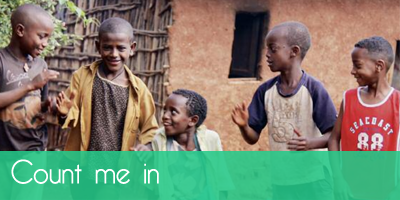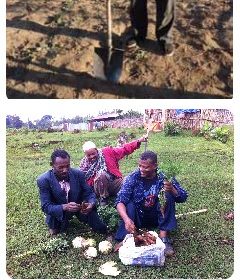The starting point for inclusion of people with a disability and elderly should be equal opportunities, but it is recognized that there still may be a need for special services in order to achieve inclusion1. In terms of agricultural water management, this could mean that people with a disability are engaged in mainstream farming, but have access to special tools or appliances as well as arrangements that help in carrying out the work (also see the adaptation and tools page).
When it comes to mainstreaming disability with a strong focus on enabling environments, there are three important strategies: (1) engagement in productive agriculture, (2) privileged access to land and water and (3) membership in farming organisations.
Engagement in productive agriculture
There are several forms of productive agriculture that offer potential for people with a disability and the elderly to be engaged in. Following the starting point, equal opportunities should be ensured within these forms of mainstream farming:
- Engagement in horticulture: In general, horticulture has advantages over other forms such as staple crop production for example. The horticultural industry offers a lot of skilled and unskilled job opportunities for people with disabilities. The industry contains many individual components such as nurseries, orchards and maintenance2. This means that it will differ per specific disability or age which component a person is or is not compatible with.
- Engagement in livestock operations: Both rain-fed and flood-based farming systems offer less opportunities for inclusion than irrigated agriculture, due to their unpredictable nature and dependence on the field crops. However, such systems are often well integrated with livestock operations, a form of mainstream farming that offers more potential for inclusion.
- Engagement in non-land based farming and multiple-use systems: Non-land based farming systems such as aquaculture, greenhouse cultivation, mushroom production and fisheries for example, are often skill-intensive. Like with horticulture, it will differ per specific disability or age which system a person is or is not compatible with. Therefore the case can be bolstered for engagement in non-land based farming systems, which often combine water sources with a multitude of activities, as a focus for engagement in productive farming.
Privileged access to land and water
In order to ensure inclusion of people with a disability and elderly in agricultural water management, there can be made use of the strategy of granting the vulnerable groups priviliged access to land and water. For instance by declaring special land titles and conferring well ownership (for veterans for example).
Membership in farmer organisations
Another opportunity for ensuring privileged access for people with disabilities and elderly is to ensure their full membership in local farmer or water management organisations. This way they will become part of the decision-making that is at the heart of agricultural water management.
Related Videos:
Also see The Way Forward for more on this topic.

